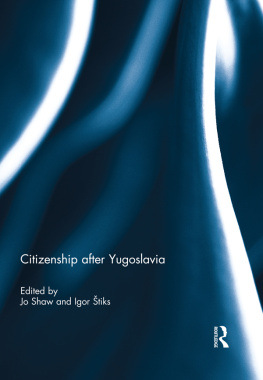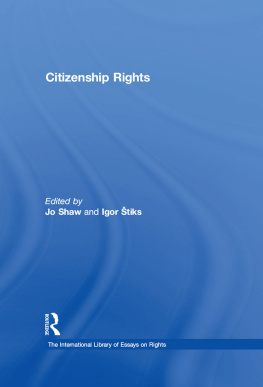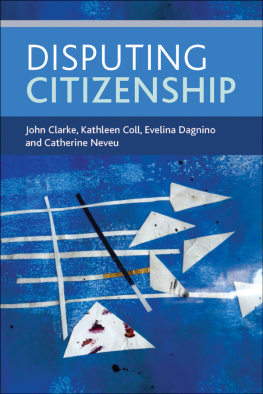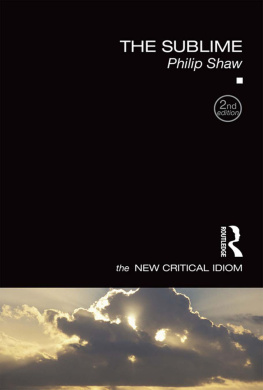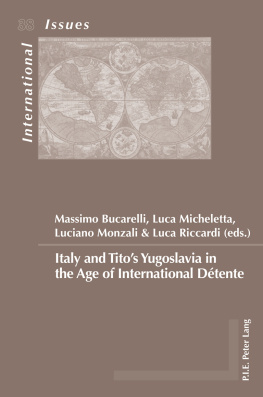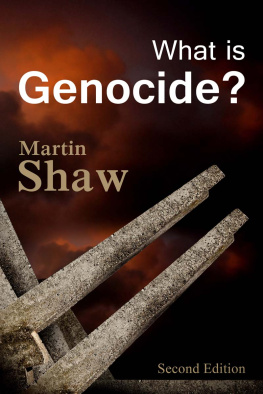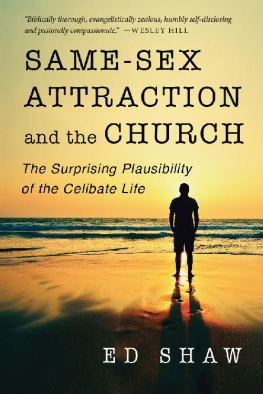Citizenship after Yugoslavia
This book is the first comprehensive examination of the citizenship regimes of the new states that emerged out of the break-up of Yugoslavia. It covers both the states that emerged out of the initial disintegration across 1991 and 1992 (Slovenia, Croatia, Bosnia-Herzegovina, the Federal Republic of Yugoslavia and Macedonia), as well as those that have been formed recently through subsequent partitions (Serbia, Montenegro and Kosovo). Citizenship has often been used as a tool of ethnic engineering to reinforce the position of the titular majority in many states. In some cases, citizenship laws and practices have been liberalised as part of a wider political settlement intended to include minority communities more effectively in the political process. Meanwhile, frequent (re)definitions of these increasingly overlapping regimes still provoke conflicts among post-Yugoslav states.
This volume shows how important it is for the field of citizenship studies to take into account the main changes in and varieties of citizenship regimes in the post-Yugoslav states, as a particular case of new state citizenship. At the same time, it seeks to show scholars of (post) Yugoslavia and the wider Balkans that the Yugoslav crisis, disintegration and wars as well as the current functioning of the new and old Balkan states, together with the process of their integration into the EU, cannot be fully understood without a deeper understanding of their citizenship regimes.
This book was originally published as a special double issue of Citizenship Studies.
Jo Shaw holds the Salvesen Chair of European Institutions in the School of Law, University of Edinburgh, UK, and is Principal Investigator of the CITSEE project.
Igor tiks is a Senior Research Fellow within the CITSEE project, School of Law, University of Edinburgh, UK.
Citizenship after Yugoslavia
Edited by
Jo Shaw and Igor tiks
First published 2013
by Routledge
2 Park Square, Milton Park, Abingdon, Oxon, OX14 4RN
Simultaneously published in the USA and Canada
by Routledge
711 Third Avenue, New York, NY 10017
Routledge is an imprint of the Taylor & Francis Group, an informa business
2013 Taylor & Francis
This book is a reproduction of Citizenship Studies, vol. 16, issue 34. The Publisher requests to those authors who may be citing this book to state, also, the bibliographical details of the special issue on which the book was based.
All rights reserved. No part of this book may be reprinted or reproduced or utilised in any form or by any electronic, mechanical, or other means, now known or hereafter invented, including photocopying and recording, or in any information storage or retrieval system, without permission in writing from the publishers.
Trademark notice: Product or corporate names may be trademarks or registered trademarks, and are used only for identification and explanation without intent to infringe.
British Library Cataloguing in Publication Data
A catalogue record for this book is available from the British Library
ISBN13: 978-0-415-52328-8
Publishers Note
The publisher would like to make readers aware that the chapters in this book may be referred to as articles as they are identical to the articles published in the special issue. The publisher accepts responsibility for any inconsistencies that may have arisen in the course of preparing this volume for print.
Contents
Jo Shaw and Igor tiks
Igor tiks
Jelena Vasiljevi
Jelena Dzankic
Gzim Krasniqi
Eldar Sarajli
Ljubica Spaskovska
Viktor Koska
Toma Deelan
The following chapters were originally published in the Citizenship Studies, volume 16, issue 34 (June 2012). When citing this material, please use the original page numbering for each article, as follows:
Chapter 1
Introduction: Citizenship in the New States of South Eastern Europe
Jo Shaw and Igor tiks
Citizenship Studies, volume 16, issue 34 (June 2012) pp. 309322
Chapter 3
Imagining and managing the nation: tracing citizenship policies in Serbia
Jelena Vasiljevi
Citizenship Studies, volume 16, issue 34 (June 2012) pp. 323336
Chapter 4
Understanding Montenegrin citizenship
Jelena Dzankic
Citizenship Studies, volume 16, issue 34 (June 2012) pp. 337352
Chapter 5
Overlapping Jurisdictions, Disputed Territory, Unsettled State: The Perplexing Case of Citizenship in Kosovo
Gzim Krasniqi
Citizenship Studies, volume 16, issue 34 (June 2012) pp. 353366
Chapter 6
Conceptualising Citizenship Regime(s) in post-Dayton Bosnia and Herzegovina
Eldar Sarajli
Citizenship Studies, volume 16, issue 34 (June 2012) pp. 367382
Chapter 7
The Fractured We and the Ethno-National I the Macedonian Citizenship Framework
Ljubica Spaskovska
Citizenship Studies, volume 16, issue 34 (June 2012) pp. 383396
Chapter 8
Framing the citizenship regime within the complex triadic nexuses: The case study of Croatia
Viktor Koska
Citizenship Studies, volume 16, issue 34 (June 2012) pp. 397412
Chapter 9
In the name of the Nation or/and Europe? Determinants of the Slovenian citizenship regime
Toma Deelan
Citizenship Studies, volume 16, issue 34 (June 2012) pp. 413430
This volume is the primary collective output from the first phase of a European Research Council funded project at the University of Edinburgh: CITSEE. CITSEE (The Europeanisation of Citizenship in the Successor States of the Former Yugoslavia: ERC 230239) focused in its first phase on rich interpretative investigations of the citizenship regimes of the seven new states that are now to be found on the territory of the former Socialist Federal Republic of Yugoslavia. Although all the papers are sole authored, this is very much a collective work, as the CITSEE team have worked together during the first three years of the projects existence to place a fresh focus on these new citizenship regimes, in part by exposing them to constant comparison to each other. No reflection on any one state is complete without reference to the citizenship regimes of most, if not all, of the other states (not to mention the regimes of the other states of wider South East Europe such as Albania, Bulgaria and Hungary, which have a particular impact on these post-Yugoslav regimes). This point applies just as much where the topic is that of dual citizenship as it does where the status and rights of minority groups are concerned. These regimes demand, therefore, comparative treatment, and this is the work that comprises the second phase of CITSEEs programme of activities, as the teams focus also widens out to consider the broader political and societal implications of citizenship status.
This field remains, however, a swiftly moving one, and these still young citizenship regimes continue to be adjusted constantly, either in respect of legislative measures or administrative implementation, under internal or external pressures, the most powerful of which stem from the European Union. While minor amendments to laws or practices do not, on the whole, represent radical shifts in policy for any of the states, cumulatively they can amount to important addendums or qualifications to the various regimes as we understood them at the end of 2011 when these papers were submitted in their final versions. For readers wanting up to date information, a variety of web sources are available including CITSEEs own websites (www.law.ed.ac.uk/citsee and www.citsee.eu) where papers, blogs and stories about citizenship in South East Europe are available, and the EUDO Citizenship Observatory, a collection of laws, country reports and comparative reports to which the CITSEE team has also contributed (www.eudo-citizenship.eu).


